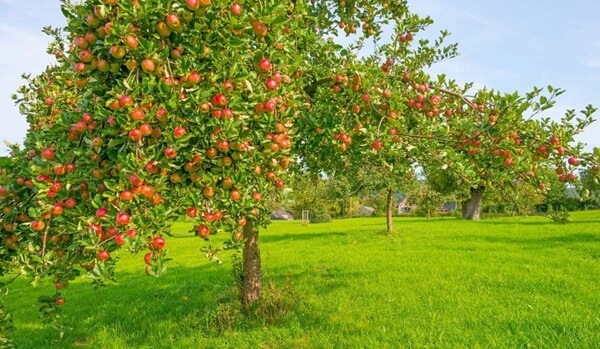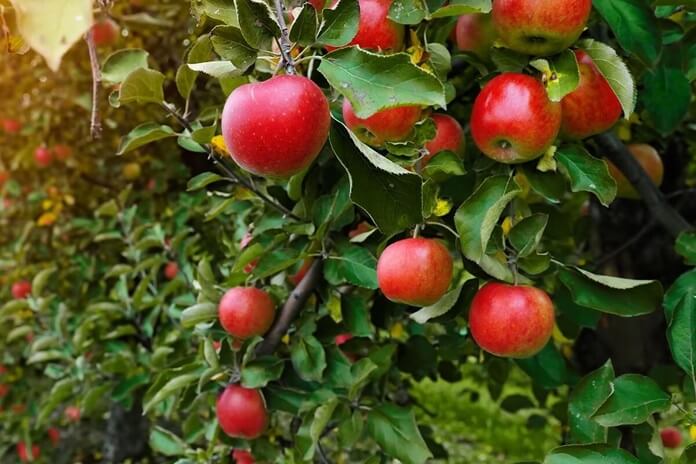pplApple Tree Day is celebrated on January 6 to honour the long-standing tradition of growing apples across North America. It was introduced to the region by colonists in the 17th century. Apple farming has led the U.S. fruit production industry for over a century. Apple is a greatly versatile fruit, used in everything from cider to pies, and offers tremendous health benefits and delicious taste. While they don’t require extra promotion, apples deserve this annual recognition for being the quintessential American fruit, present in our homes year-round. So enjoy mulled cider and fill your homes with its sweet aroma as we celebrate this wonderful holiday.
History of Apple Tree Day
Apple Tree Day originally celebrated a two-century-old apple tree, but over time, as the holiday gained wider recognition, it evolved into a celebration of apple cultivation and the benefits of this versatile fruit.
Apple trees hold great cultural significance. In ancient mythology, an apple tree is mentioned as a sacred symbol of good health and prospective happiness.
Similarly, Celtic texts referred to apples as the ‘Fruit of God,’ emphasizing their healing properties and the sense of wholeness they provide. Similarly, the goddess Aphrodite, associated with love, was linked to the apple tree, which was called the ‘Tree of Love.’
Moreover, Americans have a long-standing tradition of baking an apple pie to mark a happy occasion. Apples are one of the great commercial exports for the country as well. It generated millions of dollars in revenue every year.

Having easy access to an abundance of this natural treat is a privilege not everyone has. But, fortunately, American orchards will produce apples in abundance for generations to come.
Today, a view of apples has been a bit mixed. From the fad diets culture to clamouring to eat one apple a day and nothing else. On January 6, let’s come together to recognize the real, science-backed benefits of apples.
Timeline of Apple Tree Day
| 1620 (Introduction to America) | French Jesuits bring apple seeds to North America and spread them all across New England. |
| 1625 (The Reverend’s Plantation) | Reverend William Blaxton plants North America’s first apple orchard in Boston. |
| 1745 (The Apple Settlement) | The founders of Wachovia spread through Southeast America and introduced apple plantations to Bethabara, Salem, and Bethania. |
| 1845 (The Grand Commercialization) | A United States apple nursery catalogue markets to an international clientele and sells 350 of their best cultivars to European traders. |
5 Interesting Facts About Apple Trees That Will Amaze You
First Comes the Flower, Then the Fruit: Apples in the fall are preceded by beautiful pink, white, and yellow blossoms that bloom in the summer.
There’s a Wide World Beyond Granny Smiths: There are more than 1500 kinds of apple trees, which produce around eight five million tons of apples each year.
Apple is a Big Rose Family: Apple trees are part of the rose family, which also includes almonds, peaches, plums, cherries, and other seasonal fruits.
It’s a Century-Long Service: Apple trees can live for around 100 years if they are not affected by human or natural disturbances.
It’s a Fall Thing: As deciduous trees, apple trees shed their golden leaves when fall arrives.
Conclusion
Apple Tree Day reminds us of the rich history, cultural significance, and diverse uses of apples. From their origins in the 17th century to their deep-rooted presence in American traditions, apples symbolize much more than just fruit—they represent health, love, and community.
This day invites us to celebrate apple trees for their resilience, beauty, and the joy they bring to our tables. So, whether you’re savouring an apple pie or simply appreciating the sight of blossoming orchards, take a moment to honour this iconic fruit that has shaped history and continues to delight us year after year.
Frequently Ask Question
When were apples first introduced to North America?
Apples were introduced to North America in 1620 by French Jesuits who brought apple seeds to New England.
How did Apple Tree Day originate?
Apple Tree Day originally started as a celebration of a two-century-old apple tree. Over time, it evolved into a broader celebration of apple cultivation and the benefits of apples.
Why are apples culturally significant?
Apples hold cultural significance in ancient mythology and folklore. They are symbols of good health, happiness, and love, often associated with gods and goddesses, such as Aphrodite, the goddess of love.
What are some health benefits of apples?
Apples offer health benefits because they are rich in vitamins, antioxidants, and fiber, making them a healthy addition to your diet. Their healing properties support the idea that “an apple a day keeps the doctor away.”
How many varieties of apples are there?
There are more than 1,500 kinds of apple trees, producing about 85 million tons of apples each year worldwide.
What is the significance of apple farming in the U.S.?
Apple farming has been a key part of the U.S. fruit production industry for over a century, generating millions of dollars in revenue and serving as a staple in American homes and celebrations.
You may also like to read, National Angel Food Cake Day – October 10, 2024
